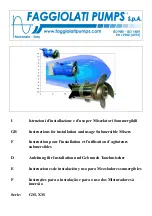
EURODESK SL3242FX-PRO/SL2442FX-PRO
Control elements and connections
5
Control elements and connections
2.
This chapter describes the various control elements of your mixing
console. All controls and connections are explained in full detail.
Mono input channels
2.1
Microphone and line inputs
2.1.1
Connectors and controls of the mic/line inputs
Fig. 2.1:
{1}
Each mono input channel is
equipped with a balanced microphone input
on an XLR connector, which provides +48 V
phantom power for condenser microphones at
the touch of a button (see rear panel).
Be sure to switch off your audio system before you
+
activate the phantom power supply to prevent audible
switch-on thumps from reaching your monitor speak
-
ers. Please also note the information given in chapter
2.11 “Rear panel”.
{2}
Each mono input also has a balanced line input on 1/4" TRS
connectors. Of course, these inputs can also be used with
unbalanced plugs (1/4" TS connector).
{3}
The
INSERT I/O
connector is used to process a signal with
dynamic processors or equalizers. This insert point ispre-
fader, pre-EQ and pre-aux send.
Unlike reverb and other effects, which are usually added to
the dry signal, dynamic processors process the entire signal.
So, aux send buses are not the best solution here. Instead,
dynamic processors and equalizers are inserted into the
signal path. Once processed, the signal then re-enters the
mixing console at the same point where it left. Signal inter-
ruption only occurs if a plug is inserted into the corresponding
jack (1/4" stereo plug: tip = signal output, ring = input). All
mono input channels are equipped with insert points. They
can also be used as pre-EQ direct outputs, without signal
flow interruption. For this you need a cable with a 1/4" TS
connector on the recorder/effects processor end, and a
bridged stereo 1/4" TRS connector on the console end (tip
and ring interconnected).
{4}
The
TRIM
control adjusts the input gain. Be sure to set this
control fully counter-clockwise before you connect or discon-
nect a signal source to or from one of the inputs.
TRIM has a dual scale: the first scale has a gain from
+10
to
+60
dB
for the MIC input.
The second scale has a gain from
+10
to
-40
dBu
for the line
input. For devices with a nomal line output level of-10 dBV
or +4 dBu the setting is as follows: with TRIM fully counter-
clockwise connect the external device and adjust the output
level recommended by the manufacturer. If available, the
output level display of the external device should read 0 dB
with signal peaks. For +4 dBu increase TRIM, for -10 dBV
increase it further. The fine-tuning can be done with a music
signal and the
LEVEL SET
LED, which will illuminate when
the optimum operating level has been set.
{5}
Mono channels are equipped with a high-slope
LOW CUT
filter eliminating unwanted low-frequency signals, such as
floor rumble (18 dB/oct., -3 dB at 80 Hz).
Equalizer
2.1.2
All mono input channels are equipped with a 3-band equalizer.
The maximum boost/cut of the individual bands is 15 dB, in mid
position the EQ is set to neutral.
Equalizer section of input channels
Fig. 2.2:
{6}
The
HI
control in the EQ section controls the high frequency
range of the respective channel. It is a shelving-type filter
which can boost or cut all frequencies above a fixed fre
-
quency (12 kHz).
{7}
The
MID
control allows you to raise or lower the mid-range
level. It is a semi-parametric peak filter, which boosts or cuts
the frequency range around a variable mid-range frequency.
Use the
FREQ
control to select the mid-range frequency
from 100 Hz to 8 kHz. Then use the MID control to boost or
cut the selected frequency range.
{8}
The
LOW
control boosts or cuts the low-frequency range.
Like the HI filter it is a shelving-type filter, which raises or
lowers the level of all frequencies below a specific frequency
(80 Hz).
Aux/FX send buses
2.1.3
Aux sends enable you to take the signals from one or multiple
channels and collect them on one bus. This signal is then present
at one of the aux send jacks, from where it can be routed to an
active monitor speaker or external effects device, for example.
The FX returns are subsequently used as a return bus for the
processed signal.
AUX/FX send controls in the channel strips
Fig. 2.3:
{9}
On each channel, the
AUX 1
and
AUX 2
controls allow
you to determine the level of the aux signals sent from the
channel. The main aux send signal comprising the aux send
signals from all channels can then be adjusted with the cor-
responding master AUX SEND controls
(51)
, and is present
at the AUX SEND outputs
(52)
. Both aux sends are mono,
post-EQ, with a gain of up to +15 dB.
(10)
Press the
PRE
switch to set all aux sends to pre-fader. In
this case, the volume of the aux signals is no longer depen-
dent on the fader position, so you can create completely
independent monitor mixes.



































